One year after a failed coup attempt to topple the government, Turkey has restored social stability and economic vibrancy and is looking beyond its region to the larger Eurasian market, the country’s top envoy to Korea stressed in a media briefing.
“A measure of order has returned to Turkey,” said Ambassador Arslan Hakan Okcal at the embassy in Seoul on Thursday. “Our economy has bounced back and is growing at 5 percent. People are going about their lives and businesses run as usual. Tourists have come back. The Turkish Airlines are fully booked from Korea.”
On July 15 -- exactly a year after the foiled putsch by anti-government forces -- a massive number of people gathered to hold a rally in Istanbul, commemorating the defeat of a coup d’etat aimed at overthrowing President Recep Tayyip Erdogan.
The coup plotters staged a nationwide mutiny through force, bombing the office of the president, the Turkish Grand National Assembly and other state and public buildings with F-16 fighter jets, combat helicopters, armored vehicles and tanks. The event lasted several hours into the night, and was foiled by Turkish citizens who took to the streets to fight the mutineers. Some 250 people died, including civilians, soldiers and police officers.
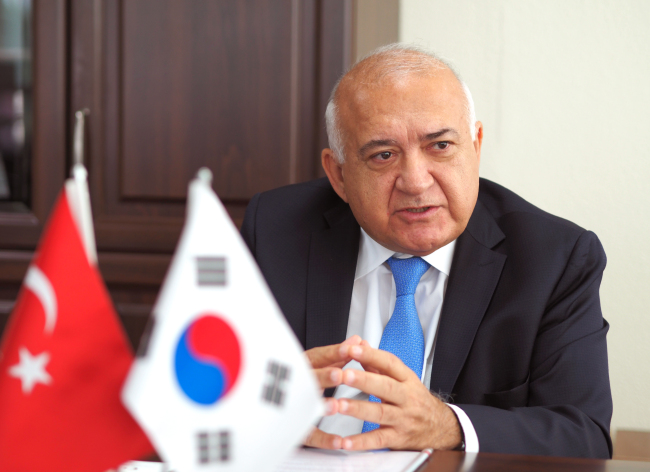 |
Turkish Ambassador to Korea Arslan Hakan Okcal (Joel Lee/The Korea Herald) |
The Turkish government has accused followers of what it labels the “Fethullah Gulen Terrorist Organization” as the culprits, saying they have infiltrated various state organs over the last 40 years. The organization’s supposed leader, Fethullah Gulen, a Muslim cleric in self-imposed exile in the United States, has reportedly given subversive instructions to members for years, but their intention was not clear until the coup, Okcal said.
Since the failed attempt, Turkish authorities have embarked on a sweeping nationwide purge, rounding up 50,000 people and sacking twice as many civil servants for suspected ties to the revolt.
The tumultuous event may have changed the country’s political dynamics to enable Erdogan to push through his constitutional reform for a presidential system, the ambassador said in reference to the constitutional referendum on April 16.
“There has been a debate for the last five decades whether a presidential or parliamentary system would serve Turkey better,” he said, adding the current multiparty parliamentary system started in 1950, when the country aspired to play an active role in global institutions like the United Nations, North Atlantic Treaty Organization and Organization for Security and Cooperation in Europe.
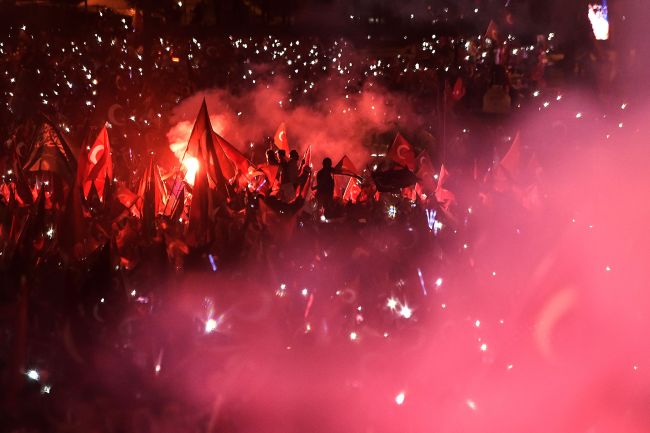 |
People stand under a collection of Turkish national flags as they gather on the “July 15 Martyrs Bridge” (Bosphorus Bridge) in Istanbul on July 15, 2017. Turkey is marking one year since the defeat of the coup aimed at ousting President Recep Tayyip Erdogan, seeking to showcase national unity and his grip on power in an increasingly polarised society. The authorities have declared July 15, a annual national holiday of “democracy and unity,” billing the foiling of the putsch as a historic victory of Turkish democracy. (AFP PHOTO) |
“But our parliament with so many parties didn’t always bring stability. Either a weak government or coalition government of incompatible parties had to be voted in. The coup attempt perhaps changed the political dynamics to allow the majority of people to support the change.”
Turkey is currently in a transition period through 2019, until which the status quo powers will be vested in the president and prime minister without change. A new presidential election will take place after 2019. Whomever is elected will have full presidential powers for five years and the prime minister’s office will be dissolved.
“There is no single blueprint for democracy. Each country and its history define the politics of the day,” said Okcal.
Noting Turkey has aspired to join the European Union for over 60 years, the diplomat acknowledged that public support for EU membership has waned in the country, as several EU member states have objected to Turkey’s membership based on what they view as lack of progress on human rights, press freedom and democratic control.
Turkey is instead turning its attention eastward, he said, pointing to China’s ambitious “One Belt, One Road” global infrastructure and development initiative, where Turkey is a major player. OBOR is a 65-nation geostrategic project that aims to create a modern Silk Road connecting China, Central Asia, Europe and Africa. It is currently in its planning stage through 2021, after which implementation will last through 2049.
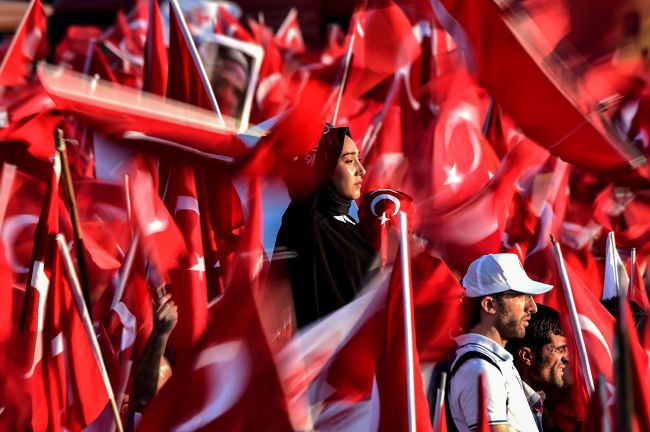 |
People wave Turkish national flags as Turkish President adresses a speech on July 15, 2017 during the first anniversary of failed coup in Istanbul. Turkey is marking one year since the defeat of the coup aimed at ousting President Recep Tayyip Erdogan with mass rallies seeking to showcase national unity in a divided society and his grip on power. The authorities have declared July 15, an annual national holiday of “democracy and unity,” billing the foiling of the putsch as a historic victory of Turkish democracy. (AFP PHOTO) |
“Turkey was the western end point of the ancient Silk Road that started from China,” Okcal explained, noting the country has undertaken projects to build intercontinental high-speed railways, highways, energy pipelines, logistics centers and ports to enhance connectivity with Eurasian economies.
In particular, the trans-Anatolian railroad project will connect Turkey, Caucasus and Central Asian countries and China, with the Turkish section completed or being upgraded; and energy pipelines will link Turkey with oil-producing Azerbaijan and Turkmenistan as well as natural gas-producing Turkmenistan, Uzbekistan and Iraq, according to the envoy.
“There are many cooperative opportunities across Eurasia, bilaterally, trilaterally and multilaterally in the context of OBOR,” the ambassador continued. “These are projects with sound financial and organizational backings. Regardless of our relations with Europe, we would have actively sought opportunities across Eurasia, because unlike the saturated Western economies, this is where the real action is.”
President Erdogan said at the OBOR’s maiden summit in Beijing in May that the colossal initiative would help defeat terrorism across the world, by way of sustainable development and improvement of living conditions in previously less accessible and underdeveloped regions.
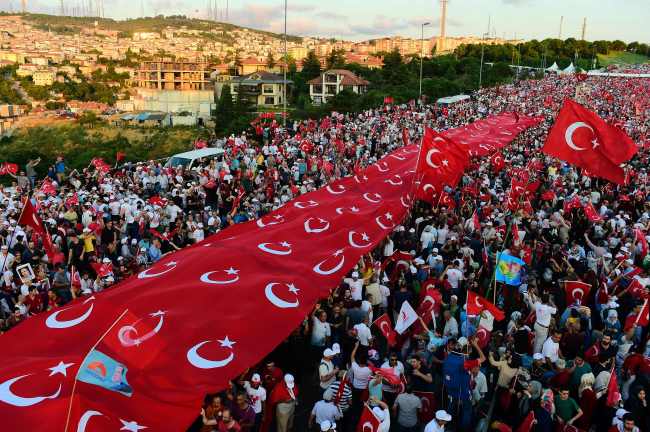 |
People stand under a collection of Turkish national flags as they gather on the “July 15 Martyrs Bridge” (Bosphorus Bridge) in Istanbul on July 15, 2017. Turkey is marking one year since the defeat of the coup aimed at ousting President Recep Tayyip Erdogan, seeking to showcase national unity and his grip on power in an increasingly polarised society. The authorities have declared July 15, a annual national holiday of “democracy and unity,” billing the foiling of the putsch as a historic victory of Turkish democracy. (AFP PHOTO) |
Touching on the issue of terrorism, which has dealt heavy blows to Turkey in recent years, Okcal said the waves of attacks have stemmed in recent months after a wall was built along the border with Syria to stop people from indiscriminately entering the country.
“The Islamic State, or Daesh, is a new-generation terrorist organization with a global presence. Internally every country must be vigilant and careful, and secondly there must be enhanced international intelligence sharing,” he said.
Collaborative opportunities with Korea lie in the two countries’ respective regions as well as third markets, he suggested.
“Once the security problems and conflicts end in the Middle East and peace sets in, there will be huge reconstruction demand for infrastructure and housing,” according to the ambassador. “We have great passion to do business as well as acumen for the region. Turkey and Korea meet very frequently bilaterally as well as through G-20.”
By Joel Lee (
joel@heraldcorp.com)
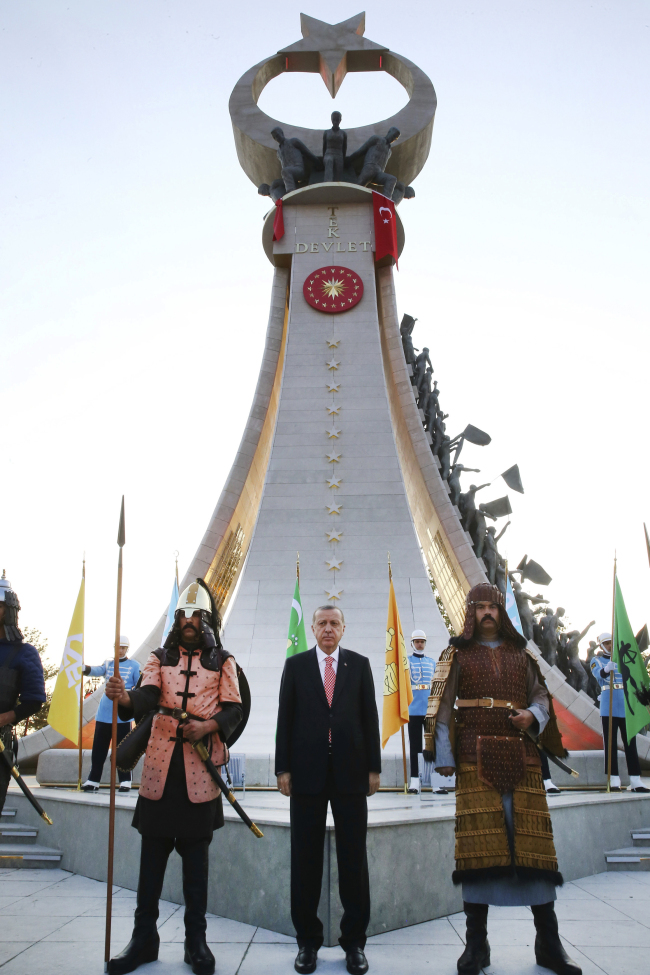 |
Turkey’s President Recep Tayyip Erdogan, center, flanked by officers, dressed in period warrior costumes, poses for pictures in front of a monument to commemorate the victims of the July 15, 2016 failed coup attempt, during its inauguration ceremony across from the Presidential Palace, in Ankara, Turkey, early Sunday, July 16, 2017. Turkey marked the anniversary of the country's crushed military coup with a series of rallies and other commemorative events. (Presidency Press Service via AP) |












